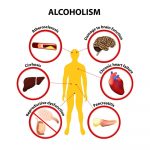- 1. Everyone Reacts To Alcohol Differently
- 2. Tolerance Is A Self-Defense Mechanism
- 3. There Are Different Types Of Tolerance
- 4. Tolerance Leads To High-Risk Drinking
- 5. Tolerance Is An Element Of Alcohol Dependence & Addiction
A person’s alcohol tolerance is dependent on a number of different factors, and a strong tolerance may be a warning sign for alcohol use disorder or addiction.
Here are five things you should know about alcohol tolerance.
1. Everyone Reacts To Alcohol Differently
While consuming alcoholic beverages does increase your tolerance over time, there are other factors that have a major impact on how much alcohol you can consume without showing overt signs of intoxication.
These include:
- gender
- age
- size
- metabolism
- genetic predispositions
- mood
Some, regardless of their level of physical fitness, are simply born with the ability to tolerate alcohol to a greater degree than most.
Others (typically those of Asian descent) may be born alcohol intolerant with a mutation in their alcohol dehydrogenase enzyme that causes a buildup of acetaldehyde in the body and uncomfortable physical side effects whenever they drink.
Still, others are born predisposed to alcohol abuse and addiction.
This wide-range of different reactions and risk levels is why many global health studies have found that there is no safe level of alcohol consumption, though the CDC and NIAAA currently advise up to 2 drinks a day for men or up to 1 drink a day for women rather than total abstinence for all.
2. Tolerance Is A Self-Defense Mechanism
Ethanol is a low-level toxin, and consuming large amounts of alcohol can lead to serious brain, heart, and liver damage, with other unwanted long-term consequences spread out across your entire body.
In response, the body makes adjustments to limit this damage, rebalancing to try to reduce or counteract both the effects of alcohol (reduced inhibition, impaired balance, slurred speech, etc.) and the damage your drinking is already doing inside you.
3. There Are Different Types Of Tolerance
Because the effects of alcohol are complex, tolerance can take a variety of different forms, including:
Functional Tolerance
Functional tolerance develops as a result of drinking alcohol over time and becoming less sensitive to the influence of alcohol on your behavior. This allows you to function even with a high blood alcohol concentration (BAC).
Functional tolerance includes both neurochemical and behavioral elements, and can develop:
- very rapidly (acute tolerance)
- in response to drinking in certain settings (environmental-dependent tolerance)
- as a response to certain repeated tasks or activities performed while drinking (learned tolerance)
Functional tolerance can be lost by reducing alcohol consumption over time. This can lead to situations where you may overestimate your ability to drink after a period of abstinence, resulting in severe impairment and effects like disinhibition, incoordination, poor reaction time, and blackouts.
Metabolic Tolerance
Metabolic tolerance refers to changes that happen inside your liver as it adapts and develops the ability to eliminate alcohol from your body more efficiently.
If you develop a higher degree of alcohol metabolism due to metabolic tolerance, you will likely be able to drink more with fewer physical side-effects as alcohol is rapidly purged from your blood.
However, you may also need to drink more in order to feel the same buzz or inebriation, putting more toxic strain on your liver and other organs as a result.
As with functional tolerance, metabolic tolerance can be lost over time, leading to an increased risk of blackouts, accidents, or alcohol poisoning if you were to overestimate your current level of tolerance after a period of reduced alcohol consumption.
4. Tolerance Leads To High-Risk Drinking
Many different drinking behaviors can lead to differing levels of tolerance with time.
But high-risk drinking patterns, especially binge drinking and heavy drinking, can lead to a dramatic increase in tolerance as well as the risk for developing alcohol use disorder.
5. Tolerance Is An Element Of Alcohol Dependence & Addiction
Building a high alcohol tolerance and increasing your alcohol consumption over time can be warning signs you may be developing a degree of alcohol dependence and/or addiction.
Alcohol Dependence
Dependence is a condition in which reducing or going without alcohol triggers withdrawal symptoms due to the body’s adjusted chemical balance. Withdrawal effects can range from uncomfortable to life-threatening in extreme cases, and can include:
- anxiety or nervousness
- depression
- fatigue
- cloudy thoughts
- irritability
- jumpiness or shakiness
- mood swings
- nightmares and sleep problems
Alcohol Addiction
Alcohol use disorder, or alcoholism, involves intense alcohol cravings and continued, escalating drinking despite the negative effects that your alcohol abuse may be having on your body, mind, relationships, and finances.
Alcohol use disorder is best addressed with medical detoxification followed by inpatient or outpatient rehabilitation and aftercare, including peer support groups.
Medication-assisted treatment (MAT) with disulfiram, naltrexone, or acamprosate may also be recommended.
If you or your loved one struggle with alcohol abuse, we can help. Contact Northeast Addictions Treatment Center today to learn more.
Sources
- https://pubs.niaaa.nih.gov/publications/aa28.htm#:~:text=This%20Alcohol%20Alert%20describes%20how,medications%3B%20and%20may%20contribute%20to
- https://www.niaaa.nih.gov/alcohol-health/overview-alcohol-consumption/moderate-binge-drinking
- https://www.niaaa.nih.gov/alcohols-effects-health/alcohols-effects-body
- https://medlineplus.gov/ency/article/000764.htm
- https://news.med.virginia.edu/deansoffice/2018/02/nih-mechanisms-of-alcohol-tolerance-r21r33-clinical-trial-not-allowed/
Written by
Northeast Addition Editorial Team
©2024 Northeast Addition Center | All Rights Reserved
This page does not provide medical advice.









